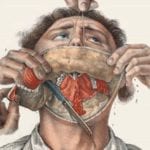 Weird Stuff
Weird Stuff  Weird Stuff
Weird Stuff  Miscellaneous
Miscellaneous 10 LEGO Facts That Will Toy with Your Mind
 Misconceptions
Misconceptions 10 Widespread Historical Myths and the Texts That Started Them
 Crime
Crime 10 Incredible Big-Time Art Fraudsters
 Movies and TV
Movies and TV 10 Most Influential Fictional Objects in Cinema History
 Our World
Our World Top 10 Real Almost‑Cities That Never Materialized
 Technology
Technology 10 Unsettling Ways Big Brother Is (Likely) Spying on You
 Music
Music 10 Chance Encounters That Formed Legendary Bands
 Space
Space 10 Asteroids That Sneaked Closer Than Our Satellites
 Sport
Sport The 10 Least Credible Superstars in Professional Sports
 Weird Stuff
Weird Stuff 10 of History’s Greatest Pranks & Hoaxes
 Miscellaneous
Miscellaneous 10 LEGO Facts That Will Toy with Your Mind
 Misconceptions
Misconceptions 10 Widespread Historical Myths and the Texts That Started Them
Who's Behind Listverse?

Jamie Frater
Head Editor
Jamie founded Listverse due to an insatiable desire to share fascinating, obscure, and bizarre facts. He has been a guest speaker on numerous national radio and television stations and is a five time published author.
More About Us Crime
Crime 10 Incredible Big-Time Art Fraudsters
 Movies and TV
Movies and TV 10 Most Influential Fictional Objects in Cinema History
 Our World
Our World Top 10 Real Almost‑Cities That Never Materialized
 Technology
Technology 10 Unsettling Ways Big Brother Is (Likely) Spying on You
 Music
Music 10 Chance Encounters That Formed Legendary Bands
 Space
Space 10 Asteroids That Sneaked Closer Than Our Satellites
 Sport
Sport The 10 Least Credible Superstars in Professional Sports
Top 10 Comedians With Depressing Histories
The old saying goes that comedy is tragedy plus time. Simple math, then, holds that more tragedy equals more comedy. Many of our funniest comedians have lived the types of bleak, sorrowful lives that prove the equation true.
So many of the people who make us laugh struggle to find their own laughter that the phenomenon has its own psychological label: the sad clown paradox. They really give Pagliacci a run for his money.
For whatever reason, the correlation between misfortune and mirth is especially strong in the true comedic greats, the human factories that refine raw pain into concentrated wit. Here are ten such comedians, those who were given the worst of tragedies and gave us back the best of comedy.
10 Jim Carrey
Nowadays, Jim Carrey is a multimillionaire who could retire this second and coast off of royalties as long as he needed. But before the lucrative television and movie roles, Carrey grew up poor. As in homeless, traveling vagrant poor.
Carrey spent a large part of his teenage years in serious poverty. His family’s fortunes varied year to year, but never rose to the level of dependable comfort. The Carrey clan spent years with no house nor even apartment, living instead all together in a van and later a tent. Even the uptick in the family’s situation, when his father gained lucrative employment, still saw teenage Carrey and his brother working as night crew janitors for his father’s employer, just to make ends meet. Even when he ‘got out,’ Carrey spent years living the life of a struggling comedian, which many can attest is not much of an upgrade.
9 Patton Oswalt
Patton Oswalt has been the king of the alt-comics for decades now, and for a while, everything in his life was picturesque. He had made it as a comedian and writer, was raising a daughter, and had found his soulmate: a writer named Michelle McNamara. That is, until she died suddenly in her sleep, leaving Oswalt a heartbroken widower and single father.
McNamara died without warning on April 21, 2016, from an unknown heart condition combined with a mix of prescription drugs—an unpredictable and surprising death. Oswalt, whose work is by nature self-reflective and confessional, has gone into great detail about how the death affected him and his daughter, including “the worst day of (his) life”: the first time he told his daughter that her mother was dead. It’s a sorrowful—but enlightening—story.
8 Maria Bamford
If there’s a poster child for mental illness (outside of vicious murderer-cannibals and the like), it’s Maria Bamford. Bamford’s comedy has repeatedly delved into her various mental issues, such as depression, anxiety, OCD, suicidal thoughts, and bipolar disorder. Dealing with several issues at once for so long has made Bamford’s life a constant struggle.
Though she always makes it hilarious, Bamford nonetheless delves deep into her struggles on stage, including the time she checked herself into a psych ward because she was close to killing herself. Luckily, she was able to avert the disaster, but Bamford’s internal fight for cognitive control is still ongoing.
7 Pete Davidson
Pete Davidson is another comedian who has worked his personal tragedy into his work. Davidson’s father was a New York City firefighter who died while responding to the September 11 attacks on the Twin Towers. Davidson was only seven at the time.
Whether directly stemming from the trauma or not, Davidson has suffered from mental health problems for most of his life. As a child at school, he once suffered a breakdown and pulled all the hair out from his scalp. He also famously posted suicidal thoughts on Instagram before quickly deleting his account altogether, prompting police to locate him and perform a wellness check. Luckily, he is still around and still seeking help.
6 Andy Dick
Many of those closest to Andy Dick have described him as being two separate people: sober Andy and drunk Andy. Dick has become notorious for his drug and alcohol use and the erratic, destructive behaviors it has caused. In an effort to treat himself, Dick has been in rehab programs more than two dozen times.
Dick is now so notorious for his constantly inappropriate behavior that new allegations and charges now blend in with the rest; his conduct is becoming normalized. Despite many high-profile public figures facing overdue consequences in the wake of the #metoo movement, Dick has never received the same public flogging- even though he has allegedly committed an unbelievable amount of offensives such as indecent exposures, sexual assaults, sexual batteries, sexual abuse, and more. It remains to be seen if any treatment will stick for Dick and beat his addiction once and for all.
5 Mitch Hedberg
Mitch Hedberg was one of the all-time great short-form joke writers. An average stand-up set from Hedberg would contain dozens of pithy, witty jokes and his impressive facility for wordplay and observation made him a huge cult hit. Hedberg was also heavily addicted to drugs and never fully committed to getting clean.
Hedberg was outspoken about his drug use; he often discussed it on stage and in interviews. Perhaps his most famous joke is, “I used to do drugs. I still do, but I used to, too.” Sadly, he was equally outspoken about not wanting to quit. Friend and fellow comedian Artie Lange, best known for his tenure on MadTV, once quoted Hedberg as saying, “Guys, don’t try to help me. I want to do heroin until I die.” In 2005, at age 37, his wish—whether joking or not—came true.
4 John Belushi
The theme of these accounts should be apparent by now, and John Belushi was no exception. Belushi was a member of the Not Ready for Primetime Players, the original SNL lineup. He consistently stole scenes with his physical humor and energy. As he became more famous and began working on more projects at once, Belushi started finding that energy elsewhere: most notably cocaine.
As Belushi began using more and more, with increasingly obvious effects, his friends and coworkers, including Carrie Fischer and “Animal House” director John Landis, attempted to coax Belushi into rehab. They failed. As he fell deeper into his addiction, Belushi began using heroin. It was an overdose of cocaine and heroin—also called a speedball—that ultimately ended his life at age 33.
3 Chris Farley
It’s hard to mention the tragic rise and fall of John Belushi without then mentioning Chris Farley. Farley’s career and personal trajectory mirrored Belushi’s uncannily closely. Farley, like Belushi, became famous as a cast member on SNL, and again like Belushi, was known for his high energy, physical humor despite his large size. Some of his most memorable skits include “Chip n’ Dales” and “Van Down by the Mirror.” Seriously—they’re hilarious, and you should go watch them right after you read this article.
The comparison continues as Farley also began taking on more and more projects, all the while falling deeper into a life of drugs. Farley’s obesity caused its own problems, as well. All told, the actor sought help for obesity and drug addiction 17 times by his death, though none were successful. He died of an overdose of cocaine and morphine at age 33.
2 Robin Williams
Robin Williams might just be the most beloved comedian ever. In addition to his extraordinary stand-up work, he starred in a range of fan-favorite films and stole almost every scene he was in. His relentless energy and manic delivery made him both completely unique and legendary. But behind that endless brightness were dark battles with disease and addiction.
Williams spent much of the 70s and 80s addicted to cocaine and though he eventually quit the drug, he then had another battle with alcoholism. Underpinning all of this was William’s well-known struggles with depression. Eventually, and only because of the autopsy after his death by suicide, it was discovered that Williams had Dementia with Lewy Bodies, which was causing his mind to unravel at the seams. His final days were plagued with anxiety, paranoia, and lost memories.
1 Richard Pryor
Richard Pryor is one of the greatest comedians of all time and, over the course of his life, brought happiness to millions. You’d be hard-pressed, however, to find a single period of that life in which Pryor found any lasting happiness himself.
Pryor grew up in a brothel where his mother was a prostitute, even turning tricks for his town mayor at one point. His mother eventually abandoned him and left him to his grandmother, the brothel’s owner, who frequently beat him. He was molested multiple times, first by an older kid, and later by a Catholic priest. His adult life was scarcely much better. Pryor was divorced seven times, had recurring problems with drugs and alcohol, and even infamously set himself on fire while high on cocaine. It was his constant smoking that eventually killed him, as it partially brought on the coronary artery disease that caused his fatal heart attack.








